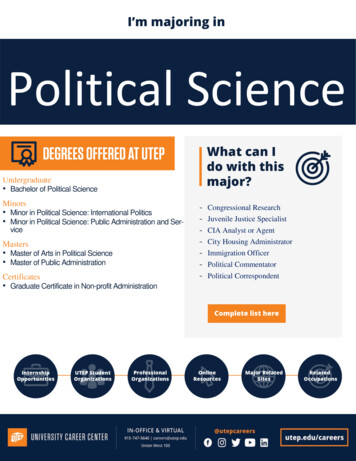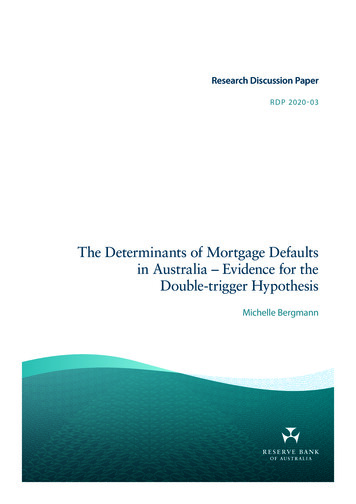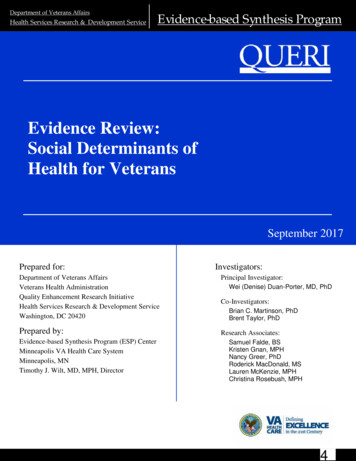
Transcription
TOWSON UNIVERSITY JOURNAL OF INTERNATIONAL AFFAIRSVOL. LV, NO. 2The Socio-Political Determinants ofScottish IndependenceAlfred J. Baird*Abstract: The quest for Scotland’s independence from the British State has involved a lengthyand enduring, if a rather uncertain pursuit, as was Ireland’s, the latter still not yet fullycomplete, though perhaps not far off. Outside of the UK, not much appears known aboutScotland’s actual constitutional status as a sovereign people and nation roped into a dubioustreaty-based parliamentary alliance with England since 1707. Similarly, within Scotland itselfthere remains limited awareness of Scotland’s constitutional or political and cultural reality;constant delivery of a prevailing distorted and biased historical narrative obscures the nation’songoing political, economic, and cultural domination and exploitation. Here, in-depthresearch and analysis based on development of a theoretical framework and application ofrelevant theoretical perspectives reveals a disturbing picture amidst the rapid need forimproved understanding and explanation behind the motivation for Scottish independence asbeing a consequence of colonialism in all its well-practised, albeit often disguised features:notably, the political and economic subjugation and exploitation of a distinct people – the Scots– which is enabled through their ongoing cultural and linguistic oppression. The theoreticalframework as developed by the author on the subject of Scotland’s independence provides fornew insights into Scotland’s oppressive colonial reality as the underlying rationale andmotivation for independence, which is also about decolonisation. The research demonstratesthe fundamental importance of Scottish national culture and the Scots language as key driversof national identity and national consciousness of a people, the latter forming the essentialbasis of independence movement solidarity, and highlights mechanisms necessary to finallybring the scourge of Scotland’s colonial oppression and exploitation to an end.Keywords: Scotland; Colonialism; Internal-Colonialism; Imperialism; Independence;Decolonisation; Self-Determination; Culture; Language; Oppression; Socio-PoliticalDeterminantsIntroductionIn the Scottish referendum on independence held in September 2014, the Scottishpeople voted 55:45 in favour of Scotland remaining part of the British (UK) state, the lattercreated though the Treaty of Union in 1706-7 by the Kingdoms of Scotland and England. Thisfollowed two earlier referendums for Scots seeking a measure of ‘home rule’ in 1979, and thenin 1997 when a 74 percent majority voted in favour of a Scottish Parliament with devolved (i.e.limited) powers. A devolved Scottish Parliament with limited powers (i.e. a non-sovereignentity) was duly established in Edinburgh in 1999, courtesy of the Scotland Act as ratified bythe UK Westminster Parliament.1
SPRING 2022THE SOCIO-POLITICAL DETERMINANTS OF SCOTTISH INDEPENDENCEIn recent years Scots have lost their EU citizenship and membership through the UK’swithdrawal from the European Union (Brexit), despite a majority of Scots (62 percent) votingto remain in the EU. The continued constitutional disquiet of Scots has resulted in theunprecedented election of three successive Scottish National Party (SNP) majorities inScotland at UK General Elections since 2015. Prior to the creation of the devolved ScottishParliament in 1999, the election of a majority of nationalist Members of Parliament (MPs) inScotland was deemed sufficient to end the UK union alliance between Scotland and England,and this was also SNP policy – and arguably its primary purpose – prior to devolution.However, the elected SNP majorities, who claim to be in favour of independence, have insteadcontinued to take their seats at Westminster, which reflects the party’s (if not the peoples’)consent to Scotland’s membership of the UK union treaty-based alliance.Meantime, the SNP, which has also been elected to run the devolved ScottishGovernment, depends on securing independence via holding another ‘Section 30’ UKsanctioned referendum, the latter requiring permission of the UK Government and theWestminster Parliament under The Scotland Act which created the devolved Parliament.However, despite the election of several Scottish nationalist majorities in Scotland (atWestminster and the devolved Parliament in Edinburgh) on a mandate of holding a secondindependence referendum, the UK Government has consistently refused to issue a Section 30Order. This results in the present political stasis whereby the British State is blocking ademocratic electorally mandated referendum on independence and has also taken the Scottishpeople out of the EU against their will, whilst elected majorities of ‘nationalist’ MPs continueto refuse to withdraw Scotland from the treaty-based alliance with England.The context in which Scottish independence is often discussed therefore raises manyquestions, not least what independence actually means, why it is considered necessary and isbeing pursued actively by a substantial portion of Scottish society, and also why some Scots
TOWSON UNIVERSITY JOURNAL OF INTERNATIONAL AFFAIRSVOL. LV, NO. 2oppose independence. The aim of this research is to provide an in-depth analysis into thequestion or phenomenon of Scottish independence and, in particular, to identify and appraisewhat are considered to be the key Social and Political Determinants of Independence, factorswhich serve to prevent and block independence and which will need to be overcome in orderfor Scotland to become an independent nation again.MethodologyIn order to identify and then analyse key factors relating to the question of Scottishindependence, the methodological approach developed and applied has involved ‘groundingout’ a theoretical framework from analysis of data collected on the subject. 1 The research isalso informed and aided by reference to postcolonial literature, the latter relevant andinformative in relation to ‘a people’ seeking self-determination and independence. Thesubsequent framework developed is collectively considered to represent ‘The Socio-PoliticalDeterminants of Scottish Independence’ (Figure 1).2* Formerly Professor of Maritime Business at Edinburgh Napier University; also holds a PhD in strategicmanagement and a BA(Hons) Degree in Business Studies, also from Edinburgh Napier University.1 Barney Glaser and Anselm Strauss. The Discovery of Grounded Theory. Chicago: Aldine, 1967.2 Alfred Baird. Doun-Hauden: The Socio-Political Determinants of Scottish Independence. Kindle DirectPublishing, 2020.3
SPRING 2022THE SOCIO-POLITICAL DETERMINANTS OF SCOTTISH lonialismInstitutionsNationalismFigure 1: The Socio-Political Determinants of Scottish IndependenceBehavioural Determinism assumes our actions are reflex reactions developed in usthrough our environmental conditioning.3 In this process it is necessary to identify key aspectsrelating to the environmental conditioning involved and associated factors that determine andhence enable or act to block independence.The methodology employed has therefore resulted in development of a structuredtheoretical framework which may be applied to investigate, analyse and more fully understandthe phenomenon and dynamics of Scottish independence.4 Here a framework-based analysishelps to: elucidate the reality of Scotland’s current socio-political situation and status; highlight3VincentA. Anfara and Norma T. Mertz. Theoretical Frameworks in Qualitative Research. Thousand Oaks,California: Sage Publications, 2015.4 Paula F. Silver. Educational Administration: Theoretical Perspectives on Practice and Research. New York:Harper & Row, 1983.
TOWSON UNIVERSITY JOURNAL OF INTERNATIONAL AFFAIRSVOL. LV, NO. 2the key challenges that the Scottish people need to overcome, and; indicate how thesechallenges may be overcome in order to secure Scotland’s independence.CultureCulture relates to our customs, beliefs and values which are transmitted and influencedthrough language.5 Cultural Imperialism involves promoting the culture and language of onedominant nation on another, which is a common feature in colonialism. 6 Scots are subject toimposition and hence domination of a British Anglophone culture and the marginalisation ofScottish culture and Scots language.Cultural Imperialism creates and reinforces an alien Cultural Hegemony7 that isimposed on Scots resulting in an Anglophone Establishment that is by nature antiindependence. Here the theory of Enculturation8 reflects the domination and prejudice of asupposedly superior anglophone elite culture that is imposed on Scots, and Scots speakers inparticular; in this, the latter are rendered subordinate and their Scots language, which is nottaught to the people, considered invalid.9This has led to development of what is termed the Scottish Cultural Cringe, which is afeeling of cultural inadequacy experienced by the subordinated (Scottish) people extending toself-hatred.10 This condition and its effects are closely related to the psychological conditionDuncan Spiers. “Education after Wittgenstein: A Causal-Cultural Theory of Reference and Meaning”.Unpublished PhD Dissertation, Trinity College Dublin, 2019.6 Robert Phillipson. Linguistic imperialism and linguicism. Oxford: Oxford University Press, 1992; JohnTomlinson. Cultural Imperialism. London: Continuum, (2nd Edition), 2001.7 Joseph A. Buttigieg. (ed.) Antonio Gramsci, Prison Notebooks. New York: Columbia University Press, 1992.8Pierre Bourdieu and Jean-Claude Passeron. Reproduction in Education, Society and Culture. London: SagePublications, 1990.9 David Purves. A Scots Grammar. Edinburgh: The Saltire Society, 1997.10 Craig Beveridge and Ronald Turnbull. The Eclipse of Scottish Culture. Edinburgh: Polygon, 1989.55
SPRING 2022THE SOCIO-POLITICAL DETERMINANTS OF SCOTTISH INDEPENDENCEknown as ‘Internalized Racism’. 11 Here there is an illusion of culture imposed on Scots, whichis a primary tool elites use to retain power 12, particularly in a colonial environment. 13Culture and national identity are closely connected and the motivation for independenceof a culturally discriminated/oppressed people is therefore directly related to their nationalculture and associated emotion. Indeed, in postcolonial theory, the independence of a people isregarded as a fight for their national culture against that of an imposed alien and henceoppressive culture and language. 14 A people’s quest for independence is thus primarilydependent on their national culture, their national identity, and hence their nationalconsciousness, the latter a function of culture and language.LanguageLinguistic perceptions directly determine our national attachments.15 Language andculture intersect to form a people’s identity, making us who we are, also influencing how wethink and view the world.16 In forming a crucial part of national culture and identity, a people’slanguage therefore defines and unites a nation; clearly, language is far more than merely ameans of communication. However, the indigenous language of the Scots, also known as‘Scots’, is not taught to the Scottish people. 17 The British state has effectively deprived Scotsof properly learning their own mother language, preventing them from fully absorbing the mainingredient and basis or foundation of their national identity. The result of this is that manyRebecca Rangel. “The Appropriated Racial Oppression Scale Development and Initial Validation.”Unpublished PhD Dissertation. Graduate School of Arts and Sciences, Columbia University, USA, 2014.12 Buttigieg, Antonio Gramsci, Prison Notebooks13 Albert Memmi. The Colonizer and the Colonized. London: Profile Books, 2021.14 Frantz Fanon. The Wretched of the Earth. Harmondsworth, Middlesex, England: Penguin Books, 1970.15 Mike Medeiros. “Redefining the Influence of Language on National Attachment: Exploring Linguistic ThreatPerceptions in Quebec.” Nationalism and Ethnic Politics 23, No. 4, (2017): 375-390.16 John M. Lipski. Varieties of Spanish in the United States. Washington DC: Georgetown University Press,2008.17 Billy Kay. Scots – The Mither Tongue. Edinburgh: Mainstream Publishing, 2006.11
TOWSON UNIVERSITY JOURNAL OF INTERNATIONAL AFFAIRSVOL. LV, NO. 2Scots today have a confused or dual national identity – British and Scottish – and hence a dualpersona.18In seeking to justify only the English language being taught to Scots in school, Britisheducationalists, even until recently, maintained that Scots was not a ‘valid’ language 19; this isethnic discrimination and an abuse of a people’s human rights – i.e. the right to one’s ownlanguage, or ‘mother tongue’. 20 The Council of Europe in its minority language reports hasrepeatedly criticised the UK and Scottish Governments for failing to teach and give authorityto the Scots language. 21 Despite this, the indigenous language of Scots remains ignored byBritish State authorities, including its devolved Scottish administration responsible foreducation of the people.The Scots are a minority ethnic group within the UK context and a people who speak aminority language (Scots), which they are prevented from learning by the British Stateeducation system. It is important to recognise that the purpose of Linguistic Imperialism is tomarginalize and destroy indigenous language; the aim of Linguistic Imperialism is linguisticgenocide or ‘linguicide’, which is to bring about the death of a language, and with that theremoval or significant diminishing of a minority people’s sense of national identity. 22Removal of a language is therefore intentional, its ultimate demise inevitable when itis not taught or given authority, as is the case with the Scots language. The Scottish census in2011 indicated that there remained only around 1.6 million people in Scotland who speak Scotsout of a total population of 5.6 million people, i.e. less than 30 percent; this implies that someTom Devine. “Carving out a Scottish Identity.” 2013. ascottish-identity.19 Basil B. Bernstein. Class, Codes and Control: Volume 1 – Theoretical Studies Towards A Sociology OfLanguage. London: Routledge and Kegan, 1971.20 Kay, Scots – The Mither Tongue, 20.21 Council of Europe. “European Charter for Regional and Minority Languages: Fifth Report of the Committeeof Experts in respect of the United Kingdom.” 2020. Secretary General's reports on the application of theEuropean Charter for Regional or Minority Languages (coe.int)/.22 Phillipson, Linguistic imperialism and linguicism.187
SPRING 2022THE SOCIO-POLITICAL DETERMINANTS OF SCOTTISH INDEPENDENCE70 percent of the Scottish population are today primarily Anglophone. Meantime, separate stateprovision has been made for the minority Gaelic language speaking community in Scotland,the nation’s other indigenous language, albeit spoken by a much smaller group, while the largerScots-speaking community continue to be ignored.Loss of language therefore undermines a people’s sense of identity and sense ofbelonging, which is an established aim and feature of colonialism. 23 Because it is our nativelanguage and culture which forms the basis of our national consciousness, 24 without theseaspects a people’s motivation for independence or nationhood and hence sovereignty is sorelydiminished. Language policy in Scotland within a UK Anglophone dominated social hierarchytherefore aims to deprive Scots of the Scots language, to kill it off, and with that to diminishand weaken desire for Scottish nationhood and independence.The cultural objective of the British State towards the Celtic Periphery nations hastherefore been to make the Scots (and the Welsh and Irish) ever more Anglophone and henceAnglicised, this forming part of a long-established imposed colonial language educationalpolicy.25 In this regard the native bourgeoisie, including the teaching profession, have generallybeen the most receptive group toward such a policy, which is necessary for them to maintaintheir socio-economic status and privileges. Postcolonial theory tells us that native elites andbourgeoisie are eager to cast off their supposedly inferior indigenous native language andculture and to embrace (i.e. mimic) that of the colonizer’s, reflecting the fact that colonialismis always a co-operative venture.26Motivation for cultural assimilation is also heavily influenced through the promotionof negative stereotypes of native (i.e. Scots) speakers supplanted in peoples’ minds via colonialIain A. MacKinnon. “Education and the colonisation of the Gaidhlig mind.” Bella Caledonia. December 3,2019. , The Wretched of the Earth, 198.25 Michael Hechter. Internal Colonialism: The Celtic Fringe in British National Development. Abingdon, Oxon:Routledge, 2017.26 Fanon, The Wretched of the Earth, 48.23
TOWSON UNIVERSITY JOURNAL OF INTERNATIONAL AFFAIRSVOL. LV, NO. 2media, broadcasting and educational policy etc., always highlighting the oppressors supposedlysuperior language and culture and placing the native in an inferior light. Further, this culturaland linguistic transition or gymnastics explains why most peoples in self-determination conflictare linguistically and hence culturally divided, in part as a consequence of colonialbilingualism.27Culture and language are clearly key factors in formation of national identity, whichmay become confusing for any people subjected to Linguistic Imperialism.28 The divide in theYes/No independence debate will therefore be, to some extent, at root linguistic; that is, thedivide is broadly between Scots speakers who identify as Scottish and who mostly tend to vote‘Yes’, and the ever-increasing Anglophone population (see section on Demographics) inScotland (which includes Scots) who identify as primarily British and who tend to vote ‘No’to Scottish independence. 29Hence the desire for and against Scottish independence is heavily influenced by cultureand language which serve to determine national (and ethnic) identity. Ethnicity is consideredimportant in that the desire for independence reflects the ethnic solidarity of an oppressed andmarginalised group, i.e. Scots speakers, amidst an imposed Cultural Division of Labourfavouring the dominant group, which is Anglophone.30 In this context it may be hypothesizedthat ethnic solidarity of the Scots speaking group, the latter mostly pro-independence, is areaction to being subjected to political, economic and cultural exploitation, with inequalities in27Memmi, The Colonizer and the Colonized, 151.Patricia A. Shaw. “Language and Identity, Language and the Land.” BC Studies – The British ColumbianQuarterly, No. 131 (Autumn 2001): 39-55.29 Ross Bond. “National identities and the 2014 independence referendum in Scotland.” Sociological ResearchOnline 20, No. 4, (2015): 92-104. https://doi.org/10.5153/sro.37930 Hechter, Internal Colonialism: The Celtic Fringe in British National Development, 356.289
SPRING 2022THE SOCIO-POLITICAL DETERMINANTS OF SCOTTISH INDEPENDENCEScottish society reflecting the outcome of prevailing institutionalised ethnic discrimination andrelated socio-linguistic prejudice.31DemographicsBetween three and four million Scots ‘left’ Scotland since the UK Union in 1707, whichis equivalent to more than half the present population. This was proportionately the largest lossof population in Western Europe for a country of Scotland’s size. 32 Successive BritishGovernment’s implemented policies and provided incentives (e.g. Empire Settlement Act) toassist with the removal of people from Scotland. Meanwhile, at the same time as millions ofScots were being given incentives to leave their country of birth, over much of the same periodthe largest ethnic migrant group into Scotland comprised people from the rest of the UK,mainly England.Outbound population flows consisted mostly of working-class Scots lacking economicopportunity in their own land, whilst inbound flows to Scotland have been historically orientedtowards a professional and managerial class sourced mainly from England. This resulted in aCultural Division of Labour in Scotland within what is described as the ‘UK InternalColonialism Model’.33With Internal Colonialism, Scotland’s industrialisation remained narrowly specialisedand hence more subject to shocks, and was geared to serving the needs of the core (Imperial)nation (i.e. England). Historically, economic growth in Scotland has been below that of thecore nation, with unemployment higher and wages lower. A quite different industrial31David Ross. Scotland: History of a Nation. New Lanark: Lomond Books, 2008; Baird, Doun-Hauden: TheSocio-Political Determinants of Scottish Independence, 261.32 Michael Anderson. “Migrants in Scotland’s population histories since 1850.” National Records of Scotland(2015) Scotland’s Population – The Registrar General’s Annual Review of Demographic Trends, 2015, No. 161(2015). United Kingdom Statistics Authority. Chapter 11: 79-106.33 Hechter, Internal Colonialism: The Celtic Fringe in British National Development, 346.
TOWSON UNIVERSITY JOURNAL OF INTERNATIONAL AFFAIRSVOL. LV, NO. 2orientation between these nations resulted in higher and sustained levels of poverty anddeprivation in Scotland, as is also evident in other parts of the UK’s Celtic Periphery.Due to the British State’s imposed limitations and constraints placed on Scotland’seconomic development, and controlling for the size of population, Scotland’s (and Ireland’s)net emigration rate was always several times greater than that of England. 34 This means that adisproportionately large share of the Scottish population has effectively been displaced(directly or indirectly) since the UK union, as a consequence of the specific economic,industrial and migration policies pursued by successive UK Governments.Scotland today has the lowest birth-rate of all nations in Britain. This may in part bedue to a continued lack of affordable housing which is exacerbated by significant levels of inmigration, low wage levels and limited access to better paid jobs for indigenous Scots speakers,as well as questionable educational policies on matters such as gender identity and thelongstanding state policy blocking teaching of the Scots language. Economic underdevelopment of a people and nation is known to parallel linguistic underdevelopment in acolonial environment.35 In Scotland, the elite is mostly Anglophone reflecting the dominantcultural hegemony and Cultural Division of Labour imposed through the UK Unionarrangement, which is further enabled by the fact the Scots language is not taught and hence ismarginalised, considered invalid and given no official status, as are those who speak it.Ongoing demographic change has significant consequences for independence. This ismainly because people whose heritage is from other nations in the UK, primarily people fromEngland which contains the bulk of the UK’s population, who come to live and work inScotland represent the ethnic group that is least likely to vote for Scottish independence. 36 ThisMichael Anderson. Scotland’s Populations from the 1850s to Today. Oxford: Oxford University Press, 2018.Memmi, The Colonizer and the Colonized, 150.36 Bond, “National identities and the 2014 independence referendum in Scotland”, 99.343511
SPRING 2022THE SOCIO-POLITICAL DETERMINANTS OF SCOTTISH INDEPENDENCEfactor alone highlights the significance of culture, language, and hence national identity on thequestion of independence.The colonial nature of Scotland’s prevailing demographics coupled with nationalvoting rights given to an ever-growing population of people now living in Scotland who do notprimarily identify as Scots serves to hinder the prospect of Scottish independence. Uncontrolleddemographic change in Scotland – a country currently lacking sovereign control over its ownborders and therefore over its population whilst remaining within the UK Union – plus theapplication of a local government/municipal voting franchise based on residence, is believedto have prevented independence in 2014 37 and serves to diminish the prospect of a ‘Yes’ votein any future referendum.38ColonialismScotland’s exit from the European Union, enforced by the UK Government andParliament against the wishes of the majority of the Scottish people, and the blocking of anelectorally mandated second independence referendum, demonstrates Scotland’s rathercolonial status in the union. 39 Colonialism is defined as a people who are subject to externalpolitical control, economic exploitation, and settler occupation and Scotland’s present realityreflects all three of these features. Postcolonial theory tells us that colonialism is primarilyabout political and economic exploitation of a people, and that colonialism is also a cooperativeventure between the oppressor/imperial power and the native elites/bourgeoisie. 40 This helpsexplain why some Scots, particularly those among the socio-economic elites, opposeindependence.Lindsay McIntosh. “Majority of Scottish born voters said ‘yes’.” The Times. March 27, 2015.https://www.thetimes.co.uk/article/ 8nt/.38 Baird, Doun-Hauden: The Socio-Political Determinants of Scottish Independence, 346.39 Baird, Doun-Hauden: The Socio-Political Determinants of Scottish Independence, 145.40 Fanon, The Wretched of the Earth, 48.37
TOWSON UNIVERSITY JOURNAL OF INTERNATIONAL AFFAIRSVOL. LV, NO. 2Scotland is subject to Internal Colonialism which involves a Cultural Division ofLabour favouring the oppressor group (and the native elite/bourgeoisie who adopt the culture,language and values of the colonial power), economic exploitation, and continued economicand social underdevelopment of the people and territory. 41 The rise of an independencemovement reflects the ethnic solidarity of indigenous (Scots) language speakers and is viewedas a consequence of Internal Colonialism, its oppressions and exploitation.Exploitation relates to the colonizer’s extraction and interception of the colony’sextensive resources (e.g. oil and gas, renewable energy etc.) at low prices, and sales back tothe ‘natives’ at higher prices 42, with regulation of the territories essential utilities and resourcesfavouring external economic interests. Necessary land reforms, including dealing with a feudallegacy, are prevented by the ruling cultural hegemony and cannot be expected until afterindependence/decolonisation. 43 With an emphasis on serving primarily the needs of the core(imperial) nation, Scotland is also used to house the UK’s nuclear weapons and submarines, awarfare system roundly rejected by most Scots, at a naval facility located downstream fromGlasgow on the River Clyde.Internal Colonialism results in the territory and most of the native (i.e. Scots-speaking)population remaining under-developed. Barely a quarter of the Scottish population areeducated to degree level, and almost half of Scotland’s people today live either in or close topoverty, with high levels of drug and alcohol addiction, illness, and lower life expectancy.44These are all features of cultural dislocation and marginalisation (i.e. inequality) of a peopledue to colonialism, unable to access their own resources or benefit from socio-economic41Hechter, Internal Colonialism: The Celtic Fringe in British National Development, 40.Duncan Hallas. (1969) “Britain’s Oldest Colony: A history of famine, brutality and heroism.” SocialistWorker, No. 137, 11 September (1969).Duncan Hallas: Britain's oldest colony (1969) (marxists.org).43 Andy Wightman. The Poor Had No Lawyers: Who owns Scotland (and how they got it). Edinburgh: Birlinn,2013.44 Joseph Rowntree Foundation. “Poverty in Scotland 2021.” Poverty in Scotland 2021 JRF.4213
SPRING 2022THE SOCIO-POLITICAL DETERMINANTS OF SCOTTISH INDEPENDENCEopportunities in their own land as they would be if they were a sovereign people in control oftheir own affairs.In a colonial environment deprivation is associated not with membership of anoppressed and exploited social class, but rather with membership of an oppressed and exploitedethnic group – i.e. the Scots.45 A common feature relates to Scotland’s top jobs – which areadvertised primarily in the Metropolitan capital, London – hence the highest wages and socialstatus which comes from these things are reserved for members of the dominant (Anglophone)culture46 or (and the qualification here is important) for members of the subordinate group whochoose to embrace the dominant culture and language. The latter aspect is referred to in thepostcolonial literature as the native ‘mimicking the colonizer’.47 Such outcomes indicate thatthe ongoing oppression of Scots is ethnically driven, hence liberation (from colonialism) mustby necessity reflect solidarity of the oppressed ethnic group. Given the global call for colonialrestitution there would seem a reasonable case for the Scots, once independent, to likewisepursue the matter.In Scotland as elsewhere, it is already established that national identities are highlysignificant when it comes to support for constitutional change. 48 Thus, the Scottishindependence movement in the Internal Colonialism model reflects primarily the ethnicsolidarity of Scots speakers. 49 This in turn implies that voters opposed to independence willmostly tend to be Anglophone and hold primarily to a British identity; this includes thoseelements of the Scots, in particular the elite/bourgeoisie native group who have opted toJames Hunter. (1977) “Reviews. Internal Colonialism: the Celtic fringe in British national development,1536-1966.” The Scottish Historical Review 56, No. 161, Part 1 (April 1977): 103-105.46 Baird, Doun-Hauden: The Socio-Political Determinants of Scottish
TOWSON UNIVERSITY JOURNAL OF INTERNATIONAL AFFAIRS VOL. LV, NO. 2 3 oppose independence. The aim of this research is to provide an in-depth analysis into the question or phenomenon of Scottish independence and, in particular, to identify and appraise what are considered to be the key Social and Political Determinants of Independence, factors










